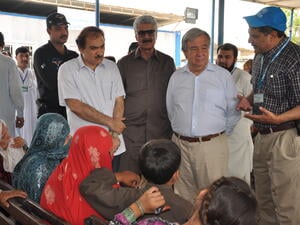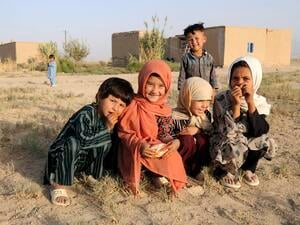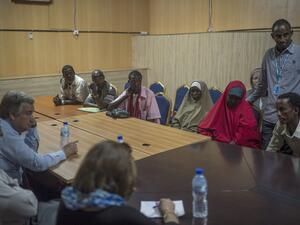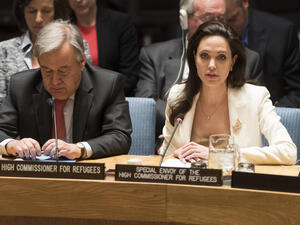High Commissioner mission to Chad this week
High Commissioner mission to Chad this week
High Commissioner António Guterres leaves tomorrow on a two-day mission to Chad, a country struggling under the weight of 370,000 refugees and internally displaced people amid growing insecurity that has spread across the border from Sudan's Darfur region.
In N'Djamena on Thursday, Mr. Guterres is expected to meet with senior Chadian officials, including the President, to discuss the dire humanitarian situation facing some 232,000 Darfur refugees and 90,000 displaced Chadians in remote eastern Chad, as well as another 48,000 Central African Republic refugees in the south. He will also hold talks with several members of the diplomatic community in N'Djamena.
On Friday, he will travel to the east of the country to meet with Darfur refugees, recently displaced Chadians, UNHCR staff and other aid workers trying to cope with one of the world's most difficult and urgent humanitarian crises.
Over the past three years, UNHCR has established a dozen remote refugee camps for hundreds of thousands of Darfurians scattered along a 600-km stretch of eastern Chad near the border with Sudan. From the start, that task has been extremely difficult because of the desolate terrain, lack of resources and infrastructure, and the ongoing displacement from Darfur. But now we're also facing the prospect of spreading insecurity within eastern Chad itself as the Darfur conflict threatens to engulf the region.
In the last 12 months, 90,000 Chadians have themselves been displaced by marauding groups of armed men on camels and horseback whose tactics mirror those of the notorious Janjaweed across the border in Darfur. On Friday and Saturday, in the latest deadly episode of inter-ethnic fighting that has been increasing in intensity since November, attacks on villages in the Koukou Angarana area in south-eastern Chad close to Goz Amer refugee camp left about 30 people dead, including local villagers, refugees and people already internally displaced in earlier fighting. Another 30 people were wounded. Government forces countered the attack in heavy fighting around the village of Habile, which is also the site of a makeshift camp for internally displaced Chadians. A total of 22 villagers and internally displaced Chadians were killed in the Habile fighting Saturday, and 93 homes were burned.
Chadian authorities say they will remain to keep the area secure. With the attacks so close to the Goz Amer refugee camp, which has over 18,000 residents, the refugees are understandably tense and concerned for their security. They are afraid to work their fields. We have reports that 5,000 of the 9,000 internally displaced Chadians at Habile site, fearing for their safety, are moving towards Koukou Angarana village even though the situation there is equally tense. Some 50 humanitarian workers in the area have been temporarily located to Goz Beida until the situation calms down.
More than 70 villages have been attacked, burned or emptied since early November. In late November, UNHCR lost more than $1 million in aid supplies looted from its main warehouse in Abéché following clashes there between the government and rebel forces.
The volatile and deteriorating security situation, which has led to UNHCR working on a skeleton staff basis in six of the 12 refugee camps in the east since late November, is of critical concern to the High Commissioner. During his mission, he will be stressing the fragility of the vital humanitarian lifeline in eastern Chad and seeking ways to strengthen it and protect the hundreds of thousands of victims of violence in the region.
In another development, a joint mission by representatives of UNHCR, the Chadian government and WFP [World Food Programme] returned yesterday (Monday) from a five-day initial technical mission to Kanem and Bet region of Chad to evaluate the suitability of alternative refugee camp sites proposed earlier this month by the government.. The proposed location for the new sites is some 500 km from N'Djamena and 500 km from the eastern border with Sudan. The mission visited some 12 sites around Moussoro, Salal, Kouba-Oulanga and Koro-Toro. The results of their assessment are expected in the coming days.







